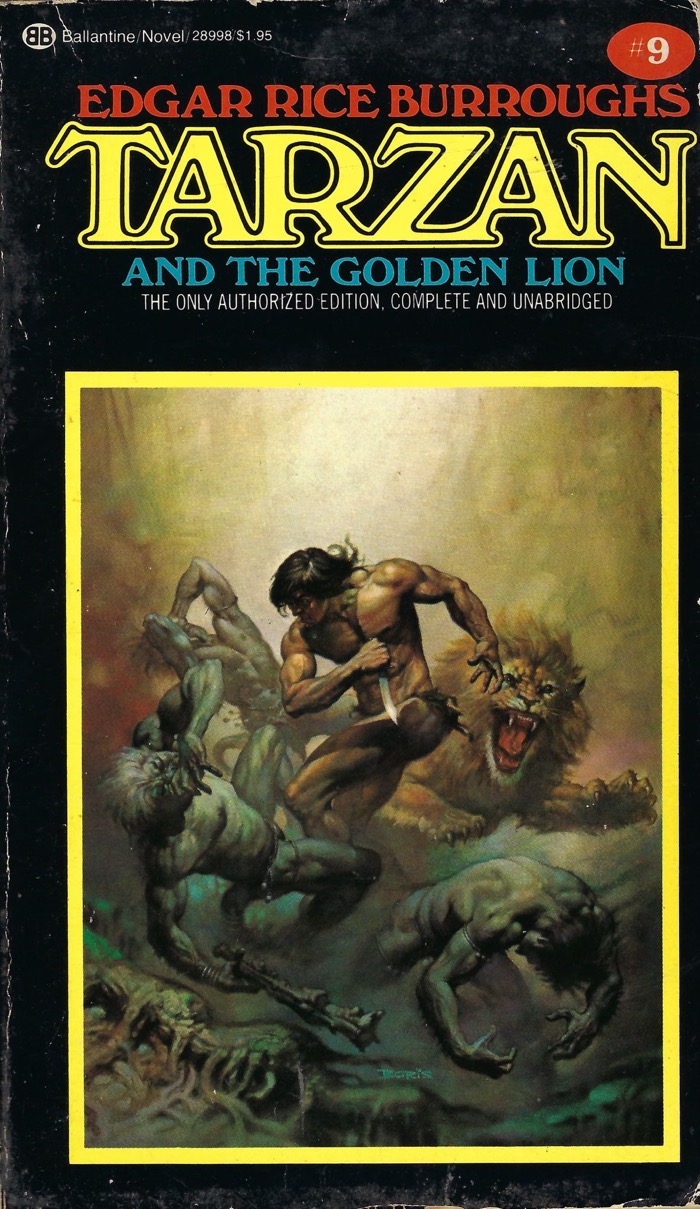Tarzan and the Golden Lion
Series: Tarzan 9
Reviewed date: 2018 Jul 8
Rating: 4
191 pages
This is my favorite Tarzan book yet. Tarzan heads off to Opar to collect some more gold, is captured by La and the Oparians. A power struggle in Opar ends with La being deposed, and La and Tarzan flee into the mountains where they encounter a strange civilization: one where men are beasts and apes rule.
Meanwhile, a band of ne'er-do-wells have found themselves a Tarzan look-alike named Estaban Miranda, and have arrived in Africa to steal gold from Opar. There are shenanigans and double-crossings, and it's loads of fun.
The titular golden lion is named Jad-bal-ja, and Tarzan raised him from a cub, training him to kill and fetch on command. So of course Jad-bal-ja shows up at just the right time to save Tarzan from a tight spot.
By now it should go without saying, but I'll mention it again: the Tarzan books are really racist. Tarzan and the Golden Lion is no exception. Somehow I'm able to still enjoy the adventure story while being aware of the racism. I find that I sort of mentally rewrite bits of the story on the fly. Weird.
Burroughs depicts black Africans as child-like, and Tarzan as a benevolent and beloved master:
[Chapter 5]
"Ah," cried the unhappy black, who had been responsible for the escape of Jad-bal-ja, "what will the Big Bwana say to me, what will he do to me when he finds that I have permitted the golden lion to get away!"
"You will be banished from the bungalow for a long time, Keewazi," old Muviro assured him. "And doubtless you will be sent to the grazing ground far to the east to guard the herd there, where you will have plenty of lions for company, though they will not be as friendly as was Jad-bal-ja. It is not half what you deserve, and were the heart of the Big Bwana not filled with love for his black children—were he like other white Bwanas old Muviro has seen—you would be lashed until you could not stand, perhaps until you died."
"I am a man," replied Keewazi. "I am a warrior and a Waziri. Whatever punishment the Big Bwana inflicts I will accept as a man should."
Burroughs falls back on the old racist idea that what a black man desires most of all is to rape a white woman:
[Chapter 17]
With fumbling fingers Luvini untied the knots of the bonds that held Jane Clayton's wrists and ankles. She felt his hot breath upon her and his bloodshot eyes and the red tongue that momentarily licked the thick lips. The instant that she felt the last thong with which she was tied fall away she leaped to her feet and sprang for the entrance to the hut, but a great hand reached forth and seized her, and as Luvini dragged her back toward him, she wheeled like a mad tigress and struck repeatedly at his grinning, ugly face. By brute force, ruthless and indomitable, he beat down her weak resistance and slowly and surely dragged her closer to him. Oblivious to aught else, deaf to the cries of the Waziri before the gate and to the sudden new commotion that arose in the village, the two struggled on, the woman, from the first, foredoomed to defeat.
The idea of Estaban Miranda looking and sounding exactly like Tarzan is a bit hard to accept. Maybe he looks pretty much like Tarzan, but close enough to fool even Jane? Not likely. But it's part of the willing suspension of disbelief that you have to accept to enjoy the story.
